|
|
|
Sort Order |
|
|
|
Items / Page
|
|
|
|
|
|
|
| Srl | Item |
| 1 |
ID:
154835
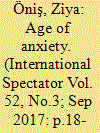

|
|
|
|
|
| Summary/Abstract |
The crisis of liberal democracy is closely associated with major global shifts, which have been accelerated by the global financial crisis of 2008, with its dislocating effects in the established democracies of the global centre. Relative stagnation and rising problems of inequality and unemployment, coupled with additional shocks in the form of mass migration and terrorist attacks have generated fertile grounds for the rise of right-wing radical populist sentiments, which have been turned into electoral advantage by charismatic leaders. The crisis of liberal democracy is also a global phenomenon in the sense that liberal democracy has been severely challenged by the rise of strategic models of capitalism, notably its authoritarian version represented by the growing power and influence of the China-Russia coalition. Indeed, the success of the latter has served as a kind of reference for many authoritarian or hybrid regimes in a changing global context, at a time when the key Western powers appear to be losing their previous economic and moral appeal.
|
|
|
|
|
|
|
|
|
|
|
|
|
|
|
|
| 2 |
ID:
180531
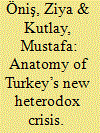

|
|
|
|
|
| Summary/Abstract |
A decade after the global financial turmoil, a new wave of crises is haunting the global South. This pattern is different from previous crisis episodes. Powerful shifts in the international order provide new policy space for emerging powers to manage their economic problems in a heterodox fashion. Key Western-led institutions no longer enjoy a monopoly in dictating the terms of financial assistance for countries in economic difficulty, as non-Western powers increasingly challenge the orthodox Washington Consensus paradigm. The present paper attempts to locate Turkey’s ongoing economic crisis in a comparative-historical context. Its central argument posits that the current crisis is the reflection of a fragile and unconsolidated presidential system and its associated mode of economic governance with state capitalist features. Turkey’s heterodox crisis allows us to draw attention to the complex interplay of global power transitions in a post-liberal international order and domestic political constellations during an era of growing authoritarian populism, generating a new equilibrium with rather unique features.
|
|
|
|
|
|
|
|
|
|
|
|
|
|
|
|
| 3 |
ID:
163068
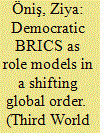

|
|
|
|
|
| Summary/Abstract |
India, Brazil and South Africa constitute an important subset of Brazil, Russia, India, China and South Africa (BRICS) and emerging powers at large in a shifting global order. The article examines the capacity of these democratic BRICS to serve as a role model to the rest of the developing world, at a time when liberal democracy seems to be experiencing serious challenges and dislocations in the Global North. The article considers the important achievements of democratic BRICS, in terms of their individual performances as well as through active cooperation strategies through organisations such as the India, Brazil and South Africa (IBSA) Dialogue Forum. Attention is drawn to the inherent structural dilemmas confronted by democratic BRICS to serve as genuine role models, given their domestic weaknesses as well as inherent constraints on their collective action strategies. Our central argument is that these countries, individually and collectively, are likely to have a crucial bearing on the future of liberal democracy on a global scale.
|
|
|
|
|
|
|
|
|
|
|
|
|
|
|
|
| 4 |
ID:
176543
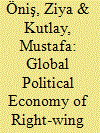

|
|
|
|
|
| Summary/Abstract |
The rise of right-wing populism should be studied as a truly global phenomenon. Domestic and regional contexts are obviously crucial, yet a narrow focus on the domestic realm fails to capture some of the key constituents and paradoxical features of the rise and resilience of right-wing populist projects around the world. Therefore, right-wing populism and the way its contradictions are ‘managed’ ought to be understood within the context of mutual interactions between: 1) an economy-identity nexus and 2) a domestic-foreign policy nexus. A critical review of six controversial aspects of right-wing populism in the global North and global South is used to substantiate this main argument.
|
|
|
|
|
|
|
|
|
|
|
|
|
|
|
|
| 5 |
ID:
179813
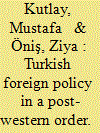

|
|
|
|
|
| Summary/Abstract |
Turkish foreign policy has dramatically transformed over the last two decades. In the first decade of the Justice and Development Party's (AKP) rule, the ‘logic of interdependence’ constituted the driving motive of Turkish foreign policy. In the second decade, however, the ‘logic of interdependence’ and the soft power-driven ‘mediator–integrator’ role were gradually replaced with a quest for ‘strategic autonomy’, accompanied by interventionism, unilateralism and coercive diplomacy. This article explores the causes of this dramatic shift. We argue that ‘strategic autonomy’, which goes beyond a moderate level of status-seeking compatible with Turkey's material power credentials, has a double connotation in the Turkish context. First, it constitutes a framework for the Turkish ruling elite to align with the non-western great powers and balance the US-led hierarchical order. Second, and more importantly, it serves as a legitimating foreign policy discourse for the government to mobilize its electoral base at home, fragment opposition and accrue popular support. We conclude that the search for autonomy from its western allies and the move towards the Russia–China axis has led to Turkey's isolation and permitted the emergence of new forms of dependence.
|
|
|
|
|
|
|
|
|
|
|
|
|
|
|
|
|
|
|
|
|